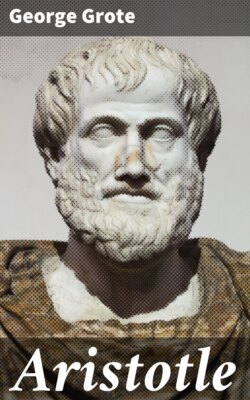Читать книгу Aristotle - Grote George - Страница 16
На сайте Литреса книга снята с продажи.
CATEGORIĆ.
ОглавлениеTable of Contents
Of the prodigious total of works composed by Aristotle, I have already mentioned that the larger number have perished. But there still remain about forty treatises, of authenticity not open to any reasonable suspicion, which attest the grandeur of his intelligence, in respect of speculative force, positive as well as negative, systematizing patience, comprehensive curiosity as to matters of fact, and diversified applications of detail. In taking account of these treatises, we perceive some in which the order of sequence is determined by assignable reasons; as regards others, no similar grounds of preference appear. The works called 1. De Clo; 2. De Generatione et Corruptione; 3. Meteorologica, are marked out as intended to be studied in immediate succession, and the various Zoological treatises after them. The cluster entitled Parva Naturalia is complementary to the treatise De Animâ. The Physica Auscultatio is referred to in the Metaphysica, and discusses many questions identical or analogous, standing in the relation of prior to a posterior, as the titles indicate; though the title Metaphysica is not affixed or recognized by Aristotle himself, and the treatise so called includes much that goes beyond the reach of the Physica. As to the treatises on Logic, Rhetoric, Ethics, Politics, Poetics, Mechanics, &c., we are left to fix for ourselves the most convenient order of study. Of no one among them can we assign the date of composition or publication. There are indeed in the Rhetorica, Politics, and Meteorologica, various allusions which must have been written later than some given events of known date; but these allusions may have been later additions, and cannot be considered as conclusively proving, though they certainly raise a presumption, that the entire work was written subsequently to those events.
The proper order in which the works of Aristotle ought to be studied (like the order proper for studying the Platonic dialogues),1 was matter of debate from the time of his earliest editors and commentators, in the century immediately preceding the Christian era. Boęthus the Sidonian (Strabos contemporary and fellow-student) recommended that the works on natural philosophy and physiology should be perused first; contending that these were the easiest, the most interesting, and, on the whole, the most successful among all the Aristotelian productions. Some Platonists advised that the ethical treatises should be put in the front rank, on the ground of their superior importance for correcting bad habits and character; others assigned the first place to the mathematics, as exhibiting superior firmness in the demonstrations. But Andronikus himself, the earliest known editor of Aristotles works, arranged them in a different order, placing the logical treatises at the commencement of his edition. He considered these treatises, taken collectively, to be not so much a part of philosophy as an Organon or instrument, the use of which must be acquired by the reader before he became competent to grasp or comprehend philosophy; as an exposition of method rather than of doctrine.2 From the time of Andronikus downward, the logical treatises have always stood first among the written or printed works of Aristotle. They have been known under the collective title of the Organon, and as such it will be convenient still to regard them.3
